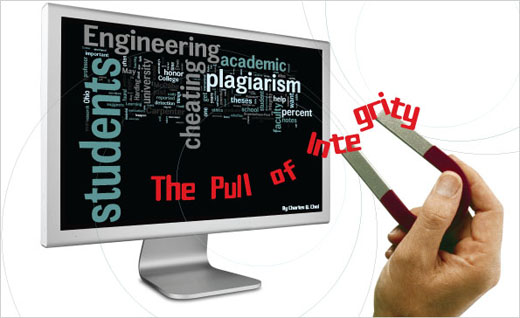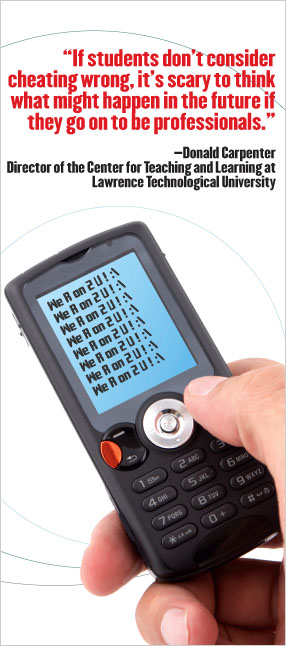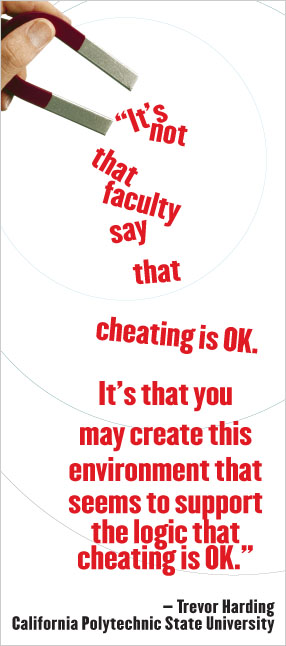The Pull Of Integrity
Sure, you can catch cheaters. But why not inspire students to stay honest?
At Ohio University’s Russ College of Engineering and Technology, graduate students now submit their theses or dissertations electronically so that the school can check them with commercial plagiarism detection software. All theses and dissertations submitted since 1980 — nearly 1,000 documents — have been digitized so they can be scanned for plagiarism. The school has its own honor code and an “academic honesty adviser” to make sure the message is well understood.
Russ College found out the hard way that such steps were necessary. In 2005 and 2006, the school was shaken by scandal after a former graduate student discovered a series of engineering master’s theses in the university library containing suspected plagiarism. An investigative committee concluded in May 2006 that “rampant and flagrant plagiarism has occurred in the graduate program of the department of mechanical engineering for over 20 years.” More than 100 master’s engineering theses have come under scrutiny, and the university is still embroiled in litigation. The scandal even found its way into a Jay Leno monologue.
The Athens, Ohio, campus is far from alone in having to confront the problem of plagiarism and other forms of cheating, according to specialists in academic ethics. In surveys, 80 percent or more of undergraduates report cheating at some point during college. And such habits are hard to break. College cheaters have been found to be more likely to keep on cheating — in graduate school, for instance, and perhaps on the job.
While the problem extends well beyond engineering students, research suggests they are among the most frequent cheaters. In a 1997 study, Rutgers University Professor of Organization Management Don McCabe and his colleagues questioned 1,946 undergraduates at 16 institutions about how often they cheated, for instance, by copying on exams or falsifying lab data. Their investigation revealed that 82 percent of engineering students reported engaging in some form of cheating. Only business students, at 91 percent, reported cheating more. More recent findings corroborated the 1997 study. In a paper delivered at ASEE’s 2007 annual conference, a group of engineering educators and researchers said engineering students reported cheating at twice the rate of humanities students on both tests and homework.
Academic cheating raises particular concern in engineering because of the potential hazards, even lethal ones, that can result from an engineer’s conduct. If a student obtained a degree without mastering the required material, would he or she be more likely to design a weak bridge or faulty computer program? Having fallen into the habit of cutting corners as a student, would an engineer be more careless about the essential steps of measuring and testing or about obtaining quality materials? In a cautionary tale, a German court last November found an engineer guilty of negligent homicide in connection with a roof collapse that killed 15 people.
“The habit of cheating in engineering students is something we really need to break,” says Donald Carpenter, an associate professor of civil engineering and director of the Center for Teaching and Learning at Lawrence Technological University in Southfield, Mich. “It’s not just that they’re not learning the material. If students don’t consider cheating wrong, it’s scary to think what might happen in the future if they go on to be professionals.”
The danger lies not only in the potential for a major disaster, such as a catastrophic failure of a building or nuclear reactor. Carpenter, one of the authors of the 2007 paper, asks his students to think of “what might happen if you do material testing for roads and you find it does well 91 percent of the time — close to what you might want, 95 percent — and you sign off on that. What happens when the mom with the family of four hits a sinkhole that was not supposed to be there? It’s not as dramatic as a whole bridge; it may only cost the life of one person, but do you want even that on your conscience?”
Courses that ‘Don’t Matter’
Aside from plagiarism – knowingly passing off someone else’s original work as one’s own – some of the more prevalent forms of cheating found in surveys of students include working in groups on assignments or take-home exams, copying other students’ homework, failing to report cheating by others, asking other students questions about an exam one hasn’t yet taken, and storing test answers in a calculator, cellphone, or PDA. A growing percentage of students acknowledge collaborating on assignments and cheating on exams, studies show.
Engineering schools may unintentionally foster cheating, Carpenter suggests, by failing to show how certain courses fit into the engineering curriculum. Physics and calculus, for example, can “come across as hurdles that you have to jump over,” he says. And engineering faculty sometimes give the impression that required humanities and social science courses don’t matter. Such messages may be interpreted as subtle encouragement to cut corners, particularly if a student is already feeling pressure to achieve high grades while managing a heavy course load, job, or internship, Carpenter warns. Reinforcing that pressure, engineering schools tend to breed the attitude “that you have to get ahead and do whatever you have to do to get that job at the end of the college rainbow,” suggests Trevor Harding, associate professor of materials engineering at California Polytechnic State University, San Luis Obispo. Like Carpenter, Harding is a member of the E3 Team — Exploring Ethical decision-making in Engineering — a multi-institutional group that since 2000 has investigated the underlying causes of cheating in engineering undergraduates.
Cheating is most prevalent in vocationally oriented academic disciplines “as opposed to learning for the sake of intellectual development,” Harding says. “It’s not that faculty say that cheating is OK. It’s that you may create this environment that seems to support the logic that cheating is OK.”
Ignorance and Mixed Messages
Student plagiarism has risen “significantly” in recent years, in large part because the Internet has made it easier to find and copy texts, says McCabe, the founding president of the Center for Academic Integrity, a consortium based at Duke University of more than 350 institutions that seeks to prevent cheating. “I would add that the number of students doing it has only gone up modestly,” McCabe says, but the same students do it more often. Nonetheless, the practice may become more widespread as students see their peers getting away with downloading and turning in papers.
Some plagiarism occurs out of simple ignorance, such as a student’s assumption that it’s all right to copy, provided a citation is given. Cynthia Finelli of the University of Michigan, chair of ASEE’s educational research and methods division and an E3 member, says, “It doesn’t help that professors can at times disagree with each other over how to cite sources as well, sending conflicting messages to students.”
Melissa Broeckelman-Post, named by Ohio University’s Russ College to the newly created post of academic honesty adviser in the wake of the plagiarism scandal, has found in her research that most cheating develops around last-minute pressure to complete an assignment. “When students don’t have enough time, and they don’t want to lose their scholarship or repeat a class or get a low GPA and not get a job or into grad school, this incentive develops,” Broeckelman-Post says.
A sensitive concern raised during the Ohio University plagiarism scandal was the relatively large number of overseas students who were implicated. Harding notes that in the E3 Team’s studies as well, “our data suggest international students are sometimes related to higher levels of cheating.” These students tended to cheat on homework and not tests, he notes. “Our anecdotal evidence suggests that in some cultures, family bonds and local community bonds are very strong, and that these bonds prioritize a commitment to the whole, rather than to the individual’s success. As a consequence, students from these cultures may see it as a norm to cheat in groups because it is benefitting the whole.” Discouraging such practices without discouraging teamwork, which is valued in engineering, requires care: “We don’t want to throw the baby out with the bathwater.” In trying to prevent cheating, it’s important not to single out or stigmatize international students, says Richard McCuen, a professor of civil and environmental engineering at the University of Maryland. “You don’t want to cast a shadow between faculty members and students, to lose that trust,” he says.
Shame is a Deterrent
If it’s impossible to stamp out cheating entirely, there are tools for catching it and changes faculty can make in their teaching styles to deter it. With online services such as Turnitin.com, institutions pay for licenses that allow teachers to compare student submissions with a database of papers to spot potential examples of copied text. “Of course, there’s also the easy method of running suspicious-looking phrases in papers past Google,” Carpenter says.
Used correctly, plagiarism-detection services can actually help teach students about academic ethics, notes Olga Francois, assistant director of the University of Maryland University College’s Center for Intellectual Property. “They can be used to help students evaluate what stage they are when it comes to learning how to cite properly, so that faculty can then provide guidance,” she says. “The top plagiarism detection services have purposely presented their tools that way. They don’t just want to be ‘gotcha’ tools.”
A downside of employing plagiarism-detection devices “is that you say, ‘I don’t trust you,’” McCabe observes. “Still, if you haven’t reached a level of trust with students yet, and you want to cut down the level of cheating, then if you tell students up front about what you are doing, it could help.”
All the same, determined cheaters will try to defeat detection software, and “all you may end up getting is a better cheater,” Carpenter notes. “And not to minimize the importance of this software, but in some respects, it seems the students that get caught this way are kind of the dumb ones. A smart student will change words around and find ways around software.”
Beyond catching plagiarists and other cheats, faculty and universities can help prevent the problem from becoming serious in the first place. To deter students from plagiarizing when they’re under pressure to turn in an assignment, faculty can ask students to submit drafts beforehand and “not put everything off until the very end,” Broeckelman-Post says. How an instructor grades can also encourage or discourage cheating. “Do you have a final test that is 70 percent of the grade, which would give an immense payoff for cheating?” Harding asks. “You can instead have regular assessments that give feedback. Tell students where they can continue to work and improve, so they can recognize they are learning.”
Students hesitate to cheat if they think they’re letting an instructor down, Finelli says. Carpenter agrees: “Shame is a huge deterrent.” But students are less likely to feel shame if the professor gives the impression that he or she doesn’t care; for example, by repeating the same exam questions every year.
The opposite impression – of an instructor who is committed to students and teaching – comes across when classes are designed in a way that actively involves students in their education. “If students are motivated to learn, then they won’t see any value in cheating,” Harding says. “Have them be creative, do design problems, have fun with engineering.”
An Expectation of Honesty
Beyond specific changes, experts say, universities need to develop a culture that discourages cheating. They should provide what Finelli calls “a strong foundation for developing ethical skills in the first place.” Beyond spotting and punishing cheaters, teachers “should try promoting an expectation for academic honesty in students,” she adds. “If students believe their peers think unethical behavior is a big deal, that makes a difference to as to whether they cheat.”
Instructors have to talk seriously in classrooms about “what is and is not plagiarism; what is and is not acceptable,” Carpenter says. Ohio University Engineering Dean Dennis Irwin notes that “there are so many different ideas people can have about plagiarism and citation that you have to discuss a number of examples.” Faculty need to be open to students’ questions, he adds: “You don’t want a situation where they make assumptions about what’s right and wrong.” Anecdotes can help highlight the potential consequences of academic cheating. “It’s hard to get 18-to-21-year-olds thinking about long-term implications, but it’s important to try,” Irwin says. “You play out possible scenarios for them to show how things can go down a slippery slope. The dangers of plagiarism shouldn’t just be about failing a class, but things further down the line in professional life.”
Too often, instructors pay lip service to a school’s honor code or academic integrity statement, thereby reducing it in the minds of students to a mere boilerplate document. One key technique for promoting honesty is to invite students to help create the school’s honor code, “to help define the problem and act on potential solutions,” McCabe says. Harding agrees: “Students have to be engaged in that process; otherwise they won’t buy into it.” He recommends discussions among faculty, administrators, and students on what academic integrity is, why it’s important, and what can be done to make it part of university life.
After the plagiarism scandal at Ohio University’s Russ College, “we developed student and faculty honor councils to help develop an honor code — what it should look like, what its purposes should be,” Broeckelman-Post says. This can be a long and difficult process. At Russ College, discussions on academic ethics continued for a year, “and we found quickly that not everyone agrees on what academic dishonesty is. When discussing case studies involving gray areas, we had faculty almost in shouting matches disagreeing on what cheating is.” Approved in 2007, the school’s honor code stresses the positive. “Instead of defining academic dishonesty, we wanted to focus on academic integrity,” Broeckelman-Post comments. “If we’re all doing a good job, if students are here to learn and teachers make sure they master the material, we shouldn’t worry about academic dishonesty.” Part of the code includes the statement that, “we members of the Russ College pledge to act with integrity and expect the same from each other.”
Just as they ought to be involved in developing an honor code, students should help determine what punishment is meted out to violators, Carpenter believes: “Students are typically harder on themselves than faculty are, something people often don’t realize.” McCabe notes that “when you can offer students certain privileges, such as helping them judge other students, they have an incentive to maintain those privileges.”
Schools need to recognize when student cheating becomes too much of a problem for it to be handled through routine channels. If a string of plagiarism incidents seem to have occurred, “immediately get outside help — that’s the biggest lesson we learned,” says Irwin, referring to the experience at Russ College. “To maintain credibility, it’s very important to get an outside investigation of the situation and its scope, and outside recommendations for dealing with it.”
When Broeckelman-Post first began investigating the prevalence of academic dishonesty at Russ College a few months before the plagiarism scandal erupted, she found that 85 percent of undergraduates admitted to some unethical behavior, a sharply higher rate than the 70 percent nationwide average. About 45 percent of students acknowledged actions widely considered cheating, “like taking what others wrote and claiming it as your own.”
A more recent survey, conducted following the school’s reform efforts, shows significant improvement. Student admission of unethical behavior dropped to 65 percent, and serious academic misconduct fell to 22 percent. But Russ College isn’t out of the woods, Broeckelman-Post acknowledges, and must continue efforts to make its new honor code part of the school’s culture: “We’ve taken important steps. But developing academic integrity takes time. It has to, to work.”
Charles Q. Choi is a freelance writer based in New York.
Category: Features


